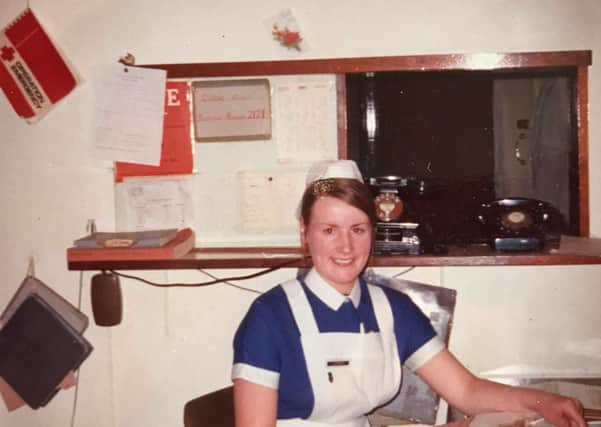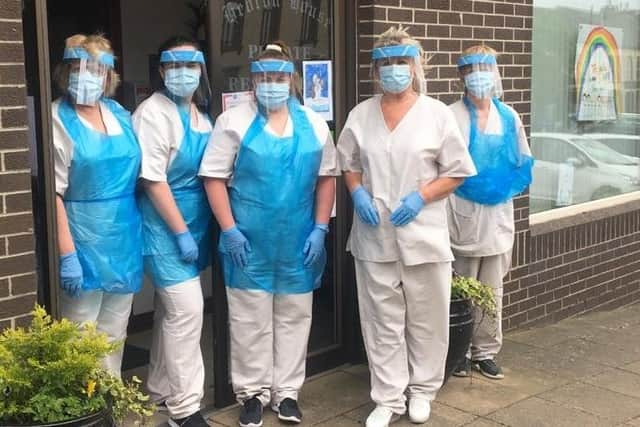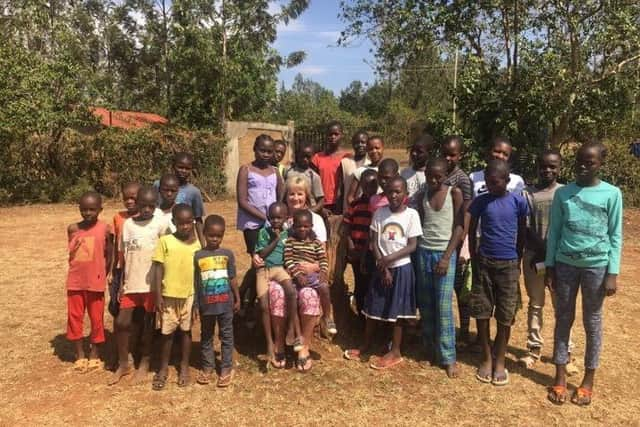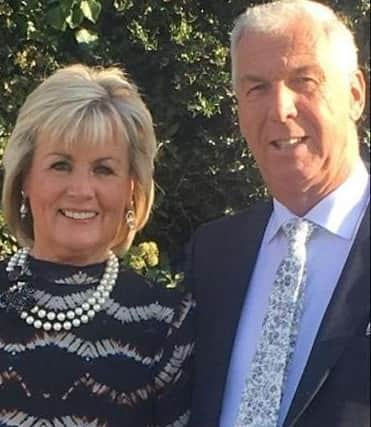NI nurse of 50 years on frontline during Troubles and pandemic


Fifty years in any career will leave you with plenty of stories to tell, but few could bring as much to a dinner party as former nurse Mildred Wylie.
Her half decade in the nursing and care profession took in the worst of the Troubles and at the very end of her career the coronavirus pandemic brought fresh challenges.
Advertisement
Hide AdAdvertisement
Hide AdStarting out as a nurse, Mildred and her husband Norman went on to set up their own private care homes and also helped to build an orphanage in Kenya.


Mildred said: “My passion in life was to help and care for people who were in need, so a nursing career in the Royal Victoria Hospital was my first choice as this was deemed to be the best training hospital in Ireland.
“In 1971, I secured an assistant nursing post at St Luke’s Hospital for mental health before I commenced my nurse training at Royal Victoria Hospital in December 1971.”
Of her role as a nurse, the mother-of-four said: “Every detail was scrutinised and there was a certain etiquette expected on the wards. You weren’t allowed, for instance, to use first names and we had to wear and make our own butterfly hats from stiff white linen.
Advertisement
Hide AdAdvertisement
Hide Ad“We had one late pass in a fortnight and an 11pm curfew. There were a lot of strict disciplines and we nurses were petrified of the sisters and even the third-year nurses.


“A very high standard was expected of us. However, when we met up with colleagues after the shift, we were able to vent our feelings, dust ourselves down and face another challenge the next day.”
Mildred’s start in nursing in 1972 coincided with one of the worst years of the Troubles: “There were many sad memories from our early days on the wards at the Royal, but there were many laughs and a great sense of camaraderie which sustained us.
“Most of us left school as teenagers and went straight to the school of nursing and, without any mental preparation, we were suddenly dealing with horrific injuries and death from bombs and bullets on a daily basis.
Advertisement
Hide AdAdvertisement
Hide Ad“In March 1972, the Abercorn bombing took place in a crowded city centre restaurant in Belfast injuring 130 people and claiming the lives of two young women. Many of the injuries were severe and included the loss of limbs and eyes.


“There were a number of those victims on the first ward I was allocated to. We were literally thrown in at the deep end experiencing some heart-breaking scenarios and it was difficult for young student nurses to deal with.”
She said: “It was very tragic to see patients and their families’ lives destroyed due to injury and trauma from the Troubles.
“It was normal to see several policemen and soldiers guarding wards, but the greatest lesson we learned was that everyone was the same when they are lying in a hospital bed.
Advertisement
Hide AdAdvertisement
Hide Ad“There were republicans in a bed beside loyalists, beside policemen and beside soldiers. No matter who it was, all the tears were the same in the end.
“We felt incredibly privileged to be stepping into someone’s life at the low moments and making a difference.”
She recalled one night the Royal Victoria Hospital came under fire from snipers as she was on her way to the canteen: “I was ordered by the security men to keep crouching as I made my way along to canteen, came back the same way and carried on with my duties. This was a scary experience. On that particular night someone was shot.
“Little did I know at that time that all these experiences were preparing me for my future.
Advertisement
Hide AdAdvertisement
Hide Ad“Three years quickly passed and I was now a registered general nurse able to take responsibility on the wards.”
In 1975 Mildred married Norman. They have four boys who have given them 15 grandchildren. She said: “We are so blessed. I have a deep personal faith and family has always been my priority as well as trusted friends. This ethos carried throughout my nursing career, and all those who were in my care were treated as if they were family, and received the utmost care, love and support, balanced with plenty of fun in their lives.”
In the same year – 1975 – Mildred came to Armagh Tower Hill Special Care Unit.
Her work with people with severe learning disabilities and mental health issues led to her and her husband Norman opening Hebron House in Markethill and Bawn Cottage in Hamiltonsbawn – two private residential homes.
Advertisement
Hide AdAdvertisement
Hide AdShe said: “We were divinely led to open up a private residential home to care for persons who were in need and treat every person who was in our care like our own family whatever their disability.
“The residents were all given a remarkable lifestyle – going abroad on holidays, experiences of aeroplanes, buses, trains, bicycles, outings to places of interest, college, meeting friends, making friends in the community, attending places of worship, gardening, art and crafts and fishing, etc.
“Life in Hebron House and the sister home Bawn Cottage remains to this day a very happy home for all those residents who have lived there despite some very challenging and dreadful times through the Troubles and lately Covid-19 pandemic.”
Mildred was on holidays with her husband and four boys on August 28, 1991 when two police officers arrived at the resort.
Advertisement
Hide AdAdvertisement
Hide AdShe said: “They asked me ‘Are you Mrs Wylie who owns Hebron House?’ A hundred things went through my mind. The policeman and police woman went on to say that there was a 1000lb bomb planted in Main Street, Markethill, and at that stage they couldn’t tell me if there were any injuries or fatalities.
“Due to the bomb all the phone lines were out of order and advised me to go immediately to my premises.”
Back in Markethill police had evacuated Hebron House.
Mildred said: “All the staff on duty swung into auto pilot and within five minutes had all the residents in their cars to take them out of the town to safety. Within minutes the bomb exploded
“Being aware the state of the Hebron House, there was no way the residents could go back and the staff were amazing, offering to take them to their own private homes as it would have been too traumatic for them to see the devastation.”
Advertisement
Hide AdAdvertisement
Hide AdOf the pandemic she said: “As the registered manager for Hebron House and Bawn Cottage residential homes, I was thrown into the front line through the first and then second wave of Covid-19 pandemic.
“With this came a need for lockdown restrictions to help reduce the risk and protect the residents from contracting this deadly disease and to protect the staff.
“This was to change the residents’ lifestyles – no outings to places of interest, no college or community events, no shopping or walking out in the parks and very few health appointments, no day care facilities and if they required to go to hospital, they had to self-isolate on return in their rooms for 14 days.
“Thankfully Covid-19 did not enter our residential homes during the whole pandemic. The staff are to be commended for being vigilant as it has not been easy wearing the full PPE.
Advertisement
Hide AdAdvertisement
Hide Ad“Lockdown has stretched the imagination of the staff team as they rose above the challenges and started to think outside the box, thinking of ways of having and doing activities which were meaningful to each resident.”
In 2002 Mildred and her husband Norman set up orphanages in Kenya to help children whose parents had died of HIV.
She recalled a visit to Nairobi with her sister in 2001: “Poverty met us everywhere – children begging, sick and crying on the streets of Nairobi. Every night Rachel and I would hear the locals wailing to alert the neighbours another death had occurred in the area.
“I vividly remember the first trip from Nairobi travelling in an old rickety mini bus through the rift valley which broke down in bandit country up to where the children’s home was situated. These bandits stopped the bus and our friends quickly threw blankets over us so we would not be identified. These bandits would have killed us if they thought we had any valuables.
Advertisement
Hide AdAdvertisement
Hide Ad“We eventually arrived and such a welcome from the children. They were dancing and singing and we were able to give them presents, and clothing. We also brought sweets which they never had in their lives. It was very moving to watch the children taking one sweet and making it last for days sharing it with their wee friends.”
She said: “We soon realised that these dear people had no means and we would have to share this dilemma when we got home to family and friends.
When we shared our real experiences, friend and family came on board and a charity was set up to improve the children’s lives and education in Kenya. Every year we visit the children’s home to ensure the funds they receive are utilised properly.”
Mildred said: “For me personally all these experiences over the years have been very rewarding and satisfying.
Advertisement
Hide AdAdvertisement
Hide AdI look forward to new challenges as I face the future and trust and pray I will enjoy good health on the next stage of my journey.”
A message from the Editor:
Thank you for reading this story on our website. While I have your attention, I also have an important request to make of you.
With the coronavirus lockdown having a major impact on many of our advertisers - and consequently the revenue we receive - we are more reliant than ever on you taking out a digital subscription.
Subscribe to newsletter.co.uk and enjoy unlimited access to the best Northern Ireland and UK news and information online and on our app. With a digital subscription, you can read more than 5 articles, see fewer ads, enjoy faster load times, and get access to exclusive newsletters and content. Visit https://www.newsletter.co.uk/subscriptions now to sign up.
Advertisement
Hide AdAdvertisement
Hide AdOur journalism costs money and we rely on advertising, print and digital revenues to help to support them. By supporting us, we are able to support you in providing trusted, fact-checked content for this website.
Alistair Bushe
Editor